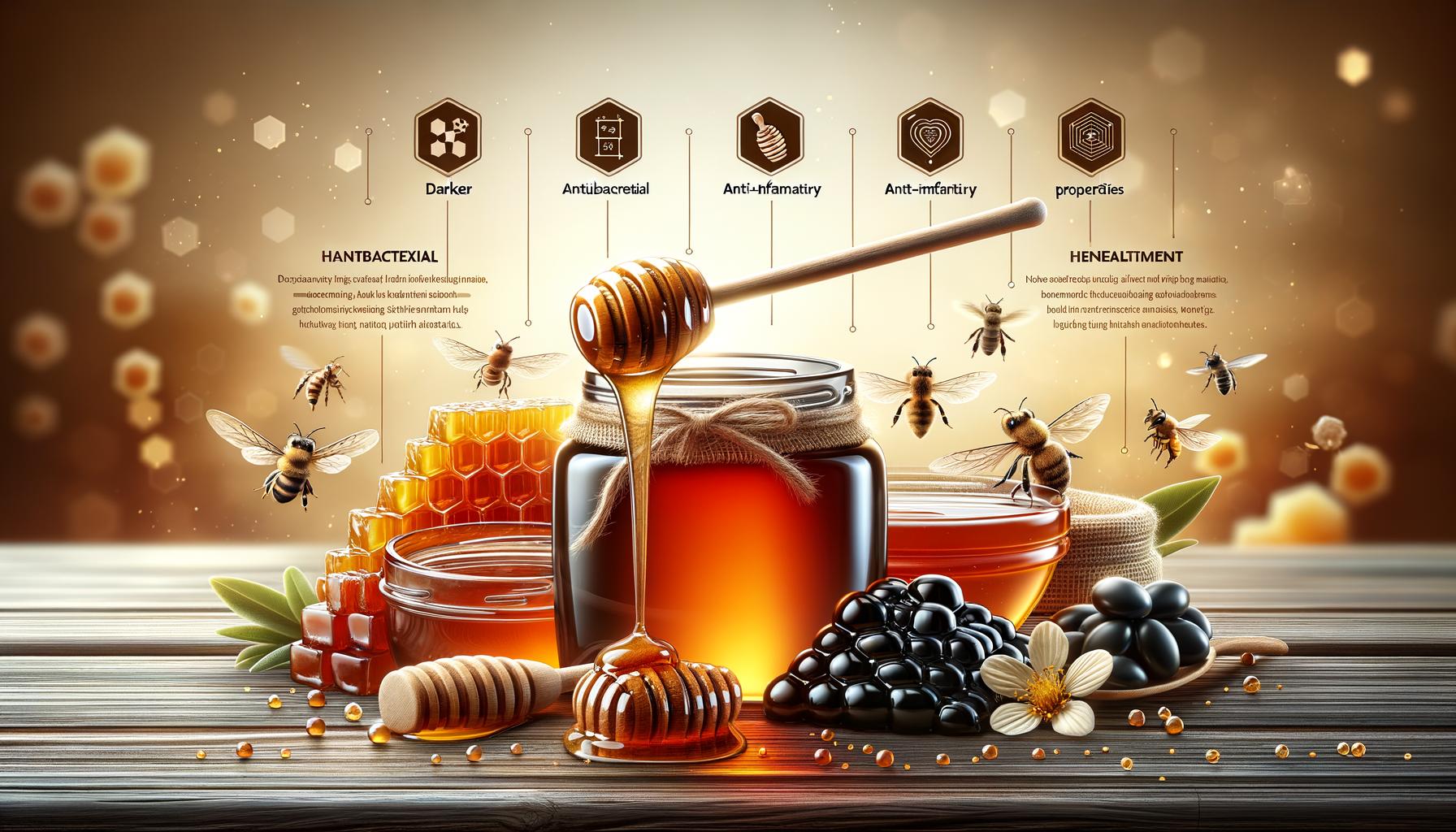· nutrition · 16 min read
Honey's Health Benefits: Sweetness & Beyond
Explore the myriad health benefits of honey, from its antibacterial properties to its role as a natural cough suppressant. Learn what sets honey apart from other natural sweeteners.

In This Post
The Fact Why Should I Care How To Put In Action Start Tomorrow Guide How does it effect my ability to focus How does it impact my daily life How does it help me make friends How does it help me manage stress How does it effect my mood Summary: Remember Refresher Checklist The Full Research Article CitationsPrint Out The Tomorrow Checklist!
Sign up for our newsletter and receive a copy today, so that, you can start tomorrow! Or the next day, or the day after that. I forget everything and starting things is hard at least for me so these checklists are godsend.
Print Out The Remember Refresher Checklist!
Sign up for our newsletter and download your own copy of the Remember Refresher Checklist, so that, you can easily put it on your fridge and help you stay on target towards your WHY. Every little bit helps.
Introduction
Honey, a natural sweetener, has been revered through the ages, not just for its sweetness but also for its rich tapestry of health benefits. From the times of ancient civilizations to modern nutritional science, honey has stood out among natural sweeteners for its unique qualities and health-promoting properties. This introductory section delves into why honey is more than just a sweet treat and explores its place in a healthy diet.
Understanding Honey’s Unique Qualities
Honey, made by bees from the nectar of flowers, is much more than a simple carbohydrate. Its complex chemical composition includes sugars primarily in the form of fructose and glucose, but it also contains water, minerals, vitamins, and a range of antioxidants. The process of honey production, where bees add enzymes to the nectar, contributes to its nutritional and medicinal qualities, including its antimicrobial and anti-inflammatory benefits.
- Honey’s variety is not just in flavor but also in its health benefits, influenced by the flowers it is derived from.
- Unlike refined sugar, honey contains small amounts of proteins, enzymes, and minerals like potassium and magnesium, which contribute to its antioxidant power.
- The uniqueness of honey lies in its antibacterial properties, attributed to its hydrogen peroxide content, acidity, and ability to produce low levels of moisture around wounds, making it a natural remedy for infections and speeding up the healing process.
Why Honey Stands Out Among Natural Sweeteners
In the realm of natural sweeteners, honey is unparalleled, not only for its taste but also for its versatile health benefits that go beyond those of other natural sweeteners like maple syrup or agave nectar.
- Honey vs. Other Sweeteners: A Nutritional Comparison. While many natural sweeteners offer certain health advantages, honey’s nutritional profile is superior, with antioxidants, vitamins, and minerals that support overall health.
- Beyond Sweetness: The Therapeutic Benefits. Honey’s health benefits extend to its use as a cough suppressant, an anti-inflammatory agent, and even its role in wound healing.
- Sustainable and Natural: Honey’s status as a product made by bees from flower nectar lends it an ecological charm that’s hard to match by sweeteners derived through more industrial processes.
Checklist of Honey’s Unique Qualities
- Made by bees from the nectar of flowers, ensuring a natural process
- Contains antioxidants, vitamins, and minerals unlike refined sugars
- Boasts antibacterial and anti-inflammatory properties for healing
- Acts as a natural cough suppressant
- Provides a wealth of health benefits beyond its role as a sweetener
In conclusion, honey’s distinctiveness among natural sweeteners lies not merely in its ability to sweeten but in its rich nutritional profile and therapeutic benefits. From aiding in digestive health and immune system support to serving as a natural remedy for coughs and wounds, honey offers a plethora of health advantages that are now being supported by scientific research. As we explore further, we’ll delve into the sweet science of honey, understanding its chemical composition and the factors that influence its health benefits.
The Sweet Science of Honey
Chemical Composition of Honey
Honey, often celebrated for its delicious taste, also boasts a complex chemical composition that underpins its numerous health benefits. At its core, honey is primarily composed of sugars, with fructose and glucose being the most abundant. These natural sweeteners make up about 70% of honey’s composition, providing a quick source of energy to the body. However, what sets honey apart from other sweeteners are the additional elements that contribute not only to its sweetness but also to its health properties.
Beyond sugars, honey contains water, but in a much smaller proportion, along with trace amounts of vitamins, minerals, amino acids, and a variety of antioxidants. These compounds include flavonoids and phenolic acids, which are pivotal in combating oxidative stress in the body. This distinctive composition varies depending on the floral source of the honey, leading to differences in both taste and health benefits. The presence of these antioxidants, in particular, speaks to why honey is more than just a sweetener, positioning it as a valuable component in a health-conscious diet.
The Antioxidant Power of Darker Honey Varieties
Darker varieties of honey, such as buckwheat honey, are especially rich in antioxidants. These natural compounds are crucial for protecting the body against free radicals, reactive molecules that can lead to cell damage and a plethora of chronic diseases. The antioxidant power of honey can be linked to its color: generally, the darker the honey, the higher the antioxidant content. This correlation highlights the importance of choosing the right honey variety to maximize health benefits.
The antioxidants found in honey, including those powerful flavonoids and phenolic acids, play a vital role in anti-inflammatory processes, potentially reducing the risk of heart disease and certain forms of cancer. Their presence underlines the unique health benefits honey offers, distinguishing it significantly from other sweeteners that lack these protective compounds.
How Honey’s Source Influences Its Health Benefits
The health benefits of honey extend beyond its chemical composition to where and how it is produced. The local environment, including the types of flowers bees visit, directly influences the nutritional profile and therapeutic properties of honey.
Geographical Location: Honey derived from specific regions can contain unique antioxidants and compounds beneficial for health. For instance, Manuka honey from New Zealand is renowned for its antibacterial properties.
Flower Varieties: The type of flowers bees pollinate significantly affects honey’s antioxidant levels and potential health benefits. Varying from clover, acacia, to eucalyptus, each variety brings distinct flavors and health-enhancing attributes.
Raw vs. Processed: Raw honey, which is unprocessed, retains the maximal amount of antioxidants, enzymes, and vitamins. In contrast, processed honey might lose some of these beneficial properties due to heat treatment and filtration.
Checklist for Maximizing the Health Benefits of Honey:
- Opt for darker honey varieties to take advantage of their higher antioxidant content.
- Choose honey based on its geographical origin and flower source for specific health benefits, such as Manuka honey for its antibacterial properties.
- Whenever possible, select raw honey to ensure you are getting all the enzymes, antioxidants, and vitamins.
Understanding the intricate relationship between honey’s source, its chemical composition, and the resulting health benefits, underscores the sweetener’s unique place in a nutritious diet. Honey is not only a natural sweetener but a complex food with diverse health-promoting properties, influenced by its environment and processing.
The Healthful Advantages of Honey
Honey, a natural sweetener with a rich history, offers a plethora of benefits beyond its delightful taste. Its unique composition endows it with several healthful properties that make it more than just a culinary delight. In this section, we delve into the scientific and traditional evidence supporting honey’s role as an antibacterial, anti-inflammatory agent, a cough suppressant, and its capability in wound healing. These attributes make honey a versatile tool in both preventive health measures and as an adjunct in treating various conditions.
Antibacterial and Anti-inflammatory Properties of Honey
Honey’s prowess as an antibacterial and anti-inflammatory agent has been recognized for centuries. It harbors an array of substances that contribute to these effects, including hydrogen peroxide, methylglyoxal, and its high sugar content, which together create an inhospitable environment for bacteria.
- Hydrogen Peroxide: Honey produces low levels of hydrogen peroxide when diluted, which is an effective antibacterial agent.
- Methylglyoxal (MGO): Especially high in Manuka Honey, MGO has strong antimicrobial properties.
- High Sugar Content: The high sugar content in honey exerts a hyperosmotic effect, which can dehydrate bacteria.
These properties make honey not just a sweet treat, but also a natural remedy for a variety of bacterial infections, potentially even those resistant to conventional antibiotics.
Honey as a Natural Cough Suppressant
Recent studies and clinical trials have uplifted honey’s status as a credible cough suppressant, rivalling over-the-counter remedies. Its thick consistency helps coat and soothe the throat, providing a dual action of immediate relief and long-term improvement in symptoms of both acute and chronic coughs. This functionality is particularly advantageous for children, offering a safer alternative to many pharmacological treatments.
- Always consult with a healthcare professional before using honey as a cough remedy, especially in children under 1 year of age.
Exploring Honey’s Role in Wound Healing
Honey’s application extends beyond internal health benefits to the external healing of wounds and burns. Its antioxidant, antibacterial, and anti-inflammatory properties promote a conducive environment for healing. By drawing out fluids from the tissue, honey cleans the wound, prevents infections, and fosters the growth of new tissue.
This multifaceted agent not only speeds up healing times but also reduces the likelihood of developing scars. Whether it’s a minor cut or a more serious burn, applying honey can support the body’s natural healing processes.
- Ensure the wound is clean before applying honey.
- Use a sterile dressing or bandage to cover the honey-treated area.
- Change the dressing daily to maintain a clean environment.
Incorporating honey into your health regime, whether for preventive measures, as a complementary treatment for coughs, or in wound care, taps into an ancient, yet scientifically-backed, natural remedy. Its antibacterial, anti-inflammatory, and health-promoting properties underscore honey’s more profound role beyond its culinary uses, making it a worthwhile addition to both the pantry and the medicine cabinet.
Nutritional Insights and Considerations
Nutritional Profile of Honey
Unveiling the nutritional landscape of honey reveals a rich tapestry of vitamins, minerals, and antioxidants. A single tablespoon of honey contains trace amounts of vitamins such as riboflavin, niacin, vitamin B6, and even vitamin C. Minerals are also present, including calcium, magnesium, phosphorus, potassium, and zinc. What truly sets honey apart are its bioactive plant compounds and antioxidants, such as flavonoids and phenolic acids, which contribute to its health benefits. Honey’s natural sugars and low glycemic index make it a viable sweetener for those monitoring their blood sugar levels, provided it is consumed in moderation.
Comparative Analysis: Honey vs. Other Natural Sweeteners
In the quest for healthier alternatives to refined sugar, natural sweeteners like maple syrup, agave nectar, and stevia have become prominent. Yet, when juxtaposed with honey, the latter’s unique antioxidant and bioactive compound contents shine. Unlike some sweeteners that undergo heavy processing, raw honey maintains its natural enzymes and antioxidants, offering more than just sweetness. Its antibacterial and anti-inflammatory properties are a testament to its superiority, making honey not just a sweetener but a functional food with health-boosting potential.
Potential Risks and Precautions When Consuming Honey
While honey is brimming with health benefits, conscious consumption is key:
- Infants and Honey: Children under one year should not be given honey due to the risk of botulism.
- Allergies: Those with allergies to bee pollen or related allergens should proceed with caution.
- Caloric Intake: Honey is high in calories and should be consumed in moderation to avoid weight gain.
- Blood Sugar Impact: Despite its lower glycemic index, honey can still affect blood sugar levels and should be used judiciously by those with diabetes.
Tips for Incorporating Honey into Your Diet
Incorporating honey into your diet can be both delightful and healthful. Here’s how you can do it responsibly:
Replace refined sugars in recipes with honey, but remember to adjust the quantities as honey is sweeter.
Add honey to your morning tea or smoothie as a natural sweetener.
Use honey as a dressing for salads or a glaze for meats to add a touch of sweetness and flavor.
Use honey in moderation to sweeten beverages and dishes
Try honey as a natural cough suppressant by taking it straight or mixed with warm water
Incorporate honey into skincare routines for its humectant properties
Explore the use of honey in wound care for its antibacterial benefits
By embracing honey’s nutritional prowess and heeding its consumption precautions, individuals can enrich their diets with this natural sweetener’s myriad of health benefits. Whether utilized for its sweetening capabilities, medicinal properties, or nutritional value, honey stands as a versatile addition to a health-conscious lifestyle.
FAQs
How Does the Type of Flower Affect Honey’s Health Benefits?
The type of flower from which bees collect nectar significantly influences the honey’s health benefits, flavor, and nutritional profile. Different flowers impart different bioactive compounds into the honey, thus affecting its antioxidant, antibacterial, and anti-inflammatory properties.
Antioxidants in Honey: Darker honeys, often derived from buckwheat or manuka flowers, typically contain higher levels of antioxidants. These compounds can neutralize harmful free radicals in the body, potentially reducing the risk of chronic diseases.
Antibacterial Properties: Certain flowers, like manuka, have strong antibacterial properties. Honey made from these flowers can be more effective in treating wounds or infections.
Anti-inflammatory Benefits: Honey from certain flowers also exhibits significant anti-inflammatory benefits, which can help soothe conditions like sore throat or aid in allergy relief.
Understanding the flower varieties and honey can guide you in choosing the right honey for specific health benefits or dietary needs.
Can Consuming Honey Help Improve Digestive Health?
Honey is not only a natural sweetener but also holds potential benefits for digestive health. Its antibacterial properties can combat harmful bacteria in the gut, supporting a healthy microbiome. Moreover, it’s believed that honey can:
- Act as a prebiotic, feeding the beneficial bacteria in the digestive system
- Soothe digestive lining and ease disorders such as gastritis and acid reflux
However, moderation is key to enjoying these benefits without experiencing negative effects due to its high fructose content.
Are There Any Negative Effects of Consuming Honey Daily?
While honey is a natural sweetener with numerous health benefits, daily consumption should be approached with caution, especially in large amounts. Possible negative effects include:
Weight Gain: High in calories and sugar, excessive consumption of honey can lead to weight gain.
Elevated Blood Sugar Levels: Despite a lower glycemic index than sugar, honey can still raise blood sugar levels, requiring individuals with diabetes to consume it cautiously.
Tooth Decay: Being sugar-rich, honey can contribute to tooth decay if dental hygiene is not adequately maintained.
To minimize these risks, consider the following checklist for incorporating honey into your diet responsibly:
- Limit intake to no more than 1-2 tablespoons per day.
- Include it as part of a balanced diet.
- Opt for raw and organic honey to maximize health benefits.
- Monitor your overall sugar consumption from all sources.
- Stay aware of any allergic reactions, especially if you’re sensitive to bee-related products.
By understanding how the type of flower affects honey’s health benefits, recognizing its role in digestive health, and acknowledging potential daily consumption risks, you can enjoy honey not just for its sweetness but also for its wide array of health benefits beyond.
Conclusion
Recapping the Unique Health Benefits of Honey
Honey is not just another natural sweetener; it’s a powerhouse of health benefits that stands unsurpassed in the realm of natural remedies. From its antibacterial and anti-inflammatory properties to its role as a cough suppressant and wound-healing agent, honey encapsulates health wonders in its sweet essence. The antioxidants in honey, especially seen in darker varieties, contribute significantly to its health-boosting features. Its chemical composition, rich in vital nutrients, plays a crucial role in supporting the immune system, promoting digestive health, and even offering benefits for skincare. Honey is truly remarkable for its multifaceted health advantages that extend far beyond just sweetening our meals.
Emphasizing the Importance of Choosing the Right Honey
In harnessing the vast health benefits of honey, the type of honey you choose plays a pivotal role. Not all honey is created equal, and understanding the differences is key to maximizing its health potential:
Organic Honey: Organic honey ensures that the bees collecting your honey are not exposed to harmful pesticides that can alter its nutritional profile and purity.
Raw Honey: Opting for raw honey means you’re getting honey in its most natural state, preserving all the enzymes, nutrients, and medicinal compounds that are often lost through pasteurization.
Manuka Honey: Known for its extraordinary health properties, including enhanced antibacterial benefits, Manuka honey is a potent variant for those looking for an extra health boost, particularly in wound healing and skincare.
Checklist for Choosing High-Quality Honey
Verify the Source: Ensure your honey is sourced from reliable, ethical beekeepers who prioritize the health of their bees and the environment.
Opt for Raw and Organic: Raw and organic labels indicate minimal processing and absence of chemicals, respectively, making these options richer in health benefits.
Consider the Flower Varieties: The flower source of the honey can affect its nutrient composition and health properties. Diverse floral sources often result in honey with a richer antioxidant profile.
Look for Trustworthy Certifications: Certifications from reputable organizations can help confirm the quality and purity of the honey you choose.
Incorporating honey into your diet is not only a sweet treat but also a step towards a healthier lifestyle. It’s a natural remedy, gifted by nature, potent with health-enhancing properties ranging from nutritional support to natural skincare and healing benefits. Remember, the key to harnessing these benefits lies in making informed choices about the type of honey you consume. By choosing high-quality, minimally processed honey, you’re tapping into an ancient source of wellness that has stood the test of time, offering a blend of sweetness and profound health benefits.
Relevant External Links
In the journey to explore honey’s health benefits, sweetness, and much beyond, it’s essential to recognize and utilize resources that offer credible, detailed, and scientifically backed information about honey and its numerous advantages. Below are three invaluable resources that can help expand your understanding of honey’s health benefits, its role as a natural cough suppressant, and insights into its antioxidant properties.
Extensive Information on Honey and Health
For those looking to deepen their knowledge on how honey contributes to health and wellness, the National Honey Board: Honey and Health serves as a comprehensive guide. This platform offers an array of articles, research findings, and nutritional facts that reinforce honey’s status as a powerful natural sweetener endowed with antibacterial properties, antioxidants, and anti-inflammatory benefits. Whether you’re curious about honey’s nutritional profile or its role in immune system support, this resource is a goldmine of information.
Honey’s Effectiveness as a Cough Remedy
The Mayo Clinic, a renowned authority in healthcare, provides an insightful look into Honey: An Effective Cough Remedy?. This resource is particularly valuable for those seeking natural remedies to alleviate coughs without resorting to over-the-counter medicines. Supported by academic research, the Mayo Clinic’s findings highlight honey’s efficacy as a cough suppressant, offering relief for those suffering from sore throats and promoting a more holistic approach to health care.
Academic Research on Honey’s Antioxidant Properties
The scientific community has long been interested in the antioxidant capacity of honey, leading to numerous studies and academic papers that delve into this topic. One such resource is the NCBI’s publication, Antioxidant Capacity of Honey, which provides an in-depth analysis of how antioxidants in honey contribute to its health benefits. Readers interested in the chemical composition of honey, especially how different flower varieties impact its antioxidant levels, will find this research invaluable.
Final Thoughts
To ensure you are making the most informed decisions about incorporating honey into your diet and leveraging its numerous health benefits, consider consulting the resources mentioned above. Here is a quick checklist to guide you in further exploring the sweet world of honey:
- Read through the extensive information available at the National Honey Board.
- Consider honey as a natural cough suppressant based on insights from the Mayo Clinic.
- Explore academic research on honey’s antioxidant properties via NCBI.
By engaging with these resources, you not only broaden your understanding of honey’s nutritional and medicinal value but also support your journey towards a healthier, more natural lifestyle.





